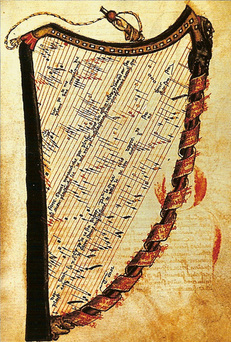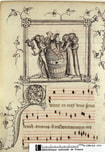
I completed my Doctoral Thesis in 2010 under the supervision of Yolanda Plumley and Giuliano Di Bacco, with Jacques Boogaart acting as external examiner for the Viva. It had the catchy title of: "Rethinking Ars Subtilior: Context, Study, Language and Performance", which was followed by the proceeding abstract:
" This dissertation attempts to re-contextualise the late fourteenth and early fifteenth century musical phenomenon now referred to as the Ars subtilior, in terms of our modern understanding of it, as well as its relationship to wider late medieval culture. In order to do so I re-examine the processes used to formulate existing retrospective definitions, identify a few compelling reasons why their re-evaluation is needed, and propose an alternative approach towards this goal. My research has led me to analyse the modern preoccupation with this repertoire, both in musicology and performance, and to explore external influences impinging on our attitudes towards it. Having outlined current attitudes and the problems of their crystallisation, I seek to re-contextualise them within medieval culture through a survey of the surviving physical evidence. The resulting observations highlight the difficulties we face when looking at the material. Above all, they point at the problems created by using narrow definitions of this style, whether these are technical, geographic, temporal or intellectual. My observations shed some light on the scale, complexity and relevance of the Ars subtilior phenomenon. The next step is to look at the music itself by analysing the use and function of stylistic features that distinguish the style. As my goal is to conceptualise the style as a whole, and not merely isolate interesting events within it, the variety of stylistic features examined is wider than those traditionally defined as characteristic of Ars subtilior. A series of case-studies examine the validity and usefulness of my conceptualisations, and attempt to couple modern inquiry into technique with an understanding of its place within medieval culture and society. In my conclusion, I attempt to bring the different strands together by proposing a new conceptualisation of the Ars subtilior which takes our understanding of medieval history and thought-patterns as a starting point, and proves useful also in a modern context. My proposal revolves around the concept of ‘exceptionality’ within a culture that seeks legitimacy. I have formulated it to make sense of the apparent appeal of this music to medieval performers, audiences, patrons, composers, compilers and collectors. Status and meaning was created by attracting attention to a work as a whole, or specific locations within its music or text, through the deviation from older or newly created norms. At the heart of my conceptualisation though, are its modern implications. My goal in this work is to transcend the technicalities of the Ars subtilior and supply scholars and performers with the tools to interpret and perform its music expressively, finding meaning in this unique musical phenomenon. "
In case this has whetted your appetite and you would like to experience the glory of its remaining 323 pages, here it is for your amusement:
" This dissertation attempts to re-contextualise the late fourteenth and early fifteenth century musical phenomenon now referred to as the Ars subtilior, in terms of our modern understanding of it, as well as its relationship to wider late medieval culture. In order to do so I re-examine the processes used to formulate existing retrospective definitions, identify a few compelling reasons why their re-evaluation is needed, and propose an alternative approach towards this goal. My research has led me to analyse the modern preoccupation with this repertoire, both in musicology and performance, and to explore external influences impinging on our attitudes towards it. Having outlined current attitudes and the problems of their crystallisation, I seek to re-contextualise them within medieval culture through a survey of the surviving physical evidence. The resulting observations highlight the difficulties we face when looking at the material. Above all, they point at the problems created by using narrow definitions of this style, whether these are technical, geographic, temporal or intellectual. My observations shed some light on the scale, complexity and relevance of the Ars subtilior phenomenon. The next step is to look at the music itself by analysing the use and function of stylistic features that distinguish the style. As my goal is to conceptualise the style as a whole, and not merely isolate interesting events within it, the variety of stylistic features examined is wider than those traditionally defined as characteristic of Ars subtilior. A series of case-studies examine the validity and usefulness of my conceptualisations, and attempt to couple modern inquiry into technique with an understanding of its place within medieval culture and society. In my conclusion, I attempt to bring the different strands together by proposing a new conceptualisation of the Ars subtilior which takes our understanding of medieval history and thought-patterns as a starting point, and proves useful also in a modern context. My proposal revolves around the concept of ‘exceptionality’ within a culture that seeks legitimacy. I have formulated it to make sense of the apparent appeal of this music to medieval performers, audiences, patrons, composers, compilers and collectors. Status and meaning was created by attracting attention to a work as a whole, or specific locations within its music or text, through the deviation from older or newly created norms. At the heart of my conceptualisation though, are its modern implications. My goal in this work is to transcend the technicalities of the Ars subtilior and supply scholars and performers with the tools to interpret and perform its music expressively, finding meaning in this unique musical phenomenon. "
In case this has whetted your appetite and you would like to experience the glory of its remaining 323 pages, here it is for your amusement:

Since then I have been lucky enough to have been appointed to a Post-Doc position in Exeter, as part of the project The Works of Guillaume de Machaut: Music, Image, Text in the Middle Ages, followed by some teaching at Shakespeare's Globe and the Schola Cantorum Basiliensis, a longer stint at King's College London, and currently at Oxford University as part of the project Music and Late Medieval Court Culture.
This might be the best way also to link to my earlier dissertation for the Schola Cantorum Basiliensis, dealing with ear training as a synthesis between historical and modern pedagogy.
This might be the best way also to link to my earlier dissertation for the Schola Cantorum Basiliensis, dealing with ear training as a synthesis between historical and modern pedagogy.
